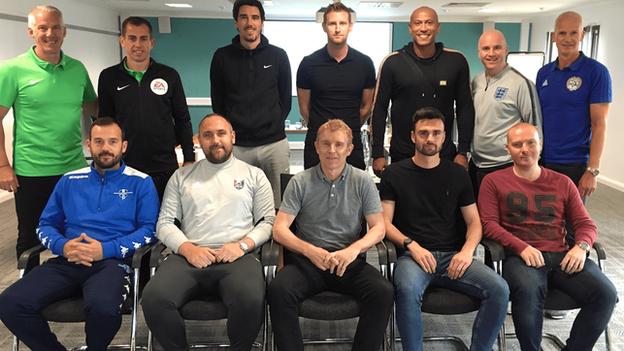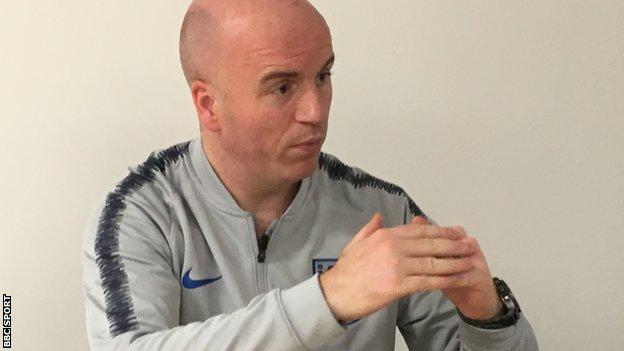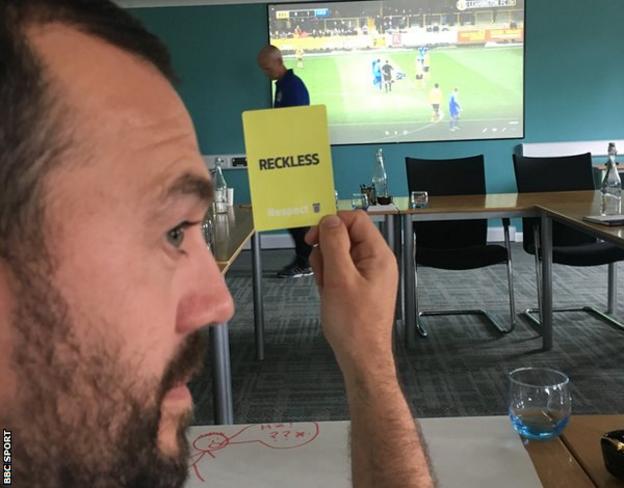Referee training: Why aren't more footballers training to become refs?
Last updated on .From the section Football

"If you can turn Darren Gough into a ballroom dancer, why can't you turn a professional footballer into a referee?"
Set aside the former England cricketer's incredible transformation, and the question - asked by John Bramhall of the Professional Footballers' Association - is a logical and long-standing one to pose.
Who better, after all, to know what's really going on in an aerial challenge or full-blooded 50-50 tackle.
The list of professional footballers who have gone on to referee at English Football League level is short, with former Huddersfield defender Steve Baines the only one to do so in the past 30 years.
So what has barred progress, and why are footballers now keener to turn from poacher to gamekeeper?
BBC Sport went to the University of Warwick to join a group of current and former players who - with the help of the game's governing bodies - are hoping to become men in black.
Why footballers are 'an untapped resource'
Former Scotland international Chris Iwelumo is the most recognisable face in a room that also contains the likes of Macclesfield midfielder Peter Vincenti, ex-Norwich and Oldham winger Lee Croft, and Chris Robertson - a free agent after leaving Swindon in June.
All have had their interest piqued by the chance to remain in the game.
Iwelumo, 41, introduces himself to the group and immediately disputes the only red card of his career, which dates back 11 years. A veteran of 18 clubs, he is hoping his wealth of experience will help him down a new path.
"It's something I spoke to the Football Association and PFA about when I retired as a player so I am glad they have opened this door," he says.
The idea is not new - PFA deputy chief executive Bramhall has been trying to push players in this direction for almost two decades.
But progress has been slow.
Former Bolton forward Tony Philliskirk qualified as a referee while still playing, but quit over concerns it would take him too long to reach the top.
The average time it takes a referee to reach the top flight is 16 years. Former official Chris Foy and newly appointed Select Group One referee Peter Bankes, who contributed to the course in Warwick, took about 20.
Philliskirk, now Burnley's under-18 coach, started officiating on Sunday mornings at the bottom of the 10-tier system.
"The first time this sort of initiative was proposed in the late 1990s, 10 players started the programme and within a year I was the only one left," says Philliskirk.
"I was playing on a Saturday and refereeing in the Rochdale and Middleton League the day after. I got promoted quickly but it's tough on your body when you are training in the day and travelling in the evening to run the line."
But the FA says it now wants to recognise "the experience and credibility of players in their development period" in order to "strip away" some of their foundation years.
By doing that, it wants to make it possible for players who excel as referees to reach the Football League within five years.
"Footballers were an untapped resource and there is merit in trying to open this up for players," says Daniel Meeson, the FA's national referee development manager.
"Some would be instantly recognised and they have an empathy, a game understanding and the communication skills already in place.
"They have been in hostile and intimidating environments as part of their normal working life, so making big decisions under pressure should be fairly routine for them."

What are the attractions for players?
As well as staying in football and putting something back into the game, there is a physical, mental and financial pull.
Many would be under the maximum 20% body fat threshold and pass the fitness tests designed to ensure officials cut a similar look to those they are refereeing.
Those who reach the international list can earn close to £200,000 per year, although that figure drops significantly outside of the EFL, with those taking charge of National League games earning about £110 per match.
"Referees have changed their body shape, fitness levels and how they look, so it's almost like they are players but in a different coloured kit," Iwelumo says.
"Footballers know what it takes to tick that box - with fitness, nutrition - and this would help players stay healthy and fill that void after football.
"A trickle of players coming through would show it could be done and there's another way for someone who loves the game."
| Football refereeing levels in England | |
|---|---|
| International | Fifa List, split into elite, first, second and third groups |
| Select Group 1 | Premier League referee |
| Select Group 2 | Championship referee |
| Level 1 | League One & League Two |
| Level 2a | National League, EFL (assistant) or Premier League (assistant) |
| Level 2b | National League North and South, National League, EFL & PL (assistant) |
| Levels 3 & 4 | Contributory, National League North & South (assistant) and supply league referees |
| Level 5 & 6 | Senior county referees and supply league assistant referee |
| Level 7 | Junior referees, supply league assistant referee |
| Level 8 | Youth referee |
| Level 9 | Trainee referee |
| Level 10 | Declared non-active referee |
And what are the challenges?
For those, like Iwelumo, who have already retired the obvious ones are age, finances and the juggling of other work commitments. Plus - for a man who represented so many clubs - the FA rule that dictates players could not referee any club they played for.
"It's a bridge the FA and governing bodies will have to cross if and when the situation arises," says Iwelumo. "They've said they will look at it and if you are good at your job that is surely what you should be judged on."
Vincenti, 33, believes there are "no barriers" to a successful transition.
"I know it's slightly different but if you think about what Roger Federer did in reaching the Wimbledon final at 37, age isn't really an issue," he says.
"Football League referees have their jobs, so it's almost part-time work for them. It could be the same for players. It's not a case of going into financial hardship, there is an opportunity to get ahead by earning qualifications as you are playing and having a co-career.
"There is not one big adjustment to playing, just loads of smaller ones because your role in the match changes. Maybe your experience as a player helps pre-empt situations and gives you the foresight to see something developing."
And Philliskirk says: "The big thing you do get is respect. Players look at you and think 'he's been in my shoes, he's walked the walk' but you still have to prove you are good and do the hard yards."
Those hard yards may include learning the laws of the game - few of the players at the University of Warwick scored more than 50% on a quiz covering some unusual incidents.
"I was laughing when we did the quiz," says Croft. "The scenario from the Arsenal v Manchester City game with Robert Pires and Thierry Henry was bizarre. I can remember playing in that game and thinking 'what is going on here?'
"I think it was the only question I got right, and that's the eye-opener because you need to know the laws inside out."




















